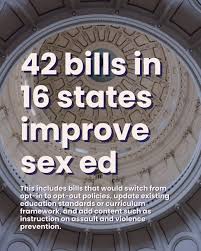Understanding the Importance of Sex Education

Introduction: Why Sex Education Matters
Sex education remains a crucial topic in the modern educational landscape. With increasing concerns regarding teenage pregnancy, sexually transmitted infections (STIs), and the need for healthy relationships, comprehensive sex education plays a pivotal role in equipping young people with the knowledge and skills necessary to navigate their sexual health and relationships responsibly. This article explores the current state of sex education in schools, addressing its importance and the pressing need for improvement.
Current Trends and Developments
Recent studies have shown a rising demand for enhanced sex education programmes across various educational institutions. According to a report by the National Campaign to Prevent Teen and Unplanned Pregnancy, one in three young people in the UK feel they haven’t received adequate sex education. Many schools still rely on outdated curricula which often fail to encompass modern issues like consent, digital safety, and LGBTQ+ inclusivity.
In light of these findings, several regions have started re-evaluating their sex education policies. For instance, England mandated that Relationships and Sex Education (RSE) became a statutory subject in schools in 2020. This initiative aims to provide students with comprehensive and age-appropriate education that empowers them to make informed choices.
Benefits of Comprehensive Sex Education
Research consistently indicates that comprehensive sex education leads to positive outcomes. For example, studies have shown that such programmes are associated with delayed sexual activity, reduced rates of teenage pregnancies, and lower incidence of STIs. Additionally, sex education fosters an environment of open dialogue regarding consent and healthy relationships, which can lead to a decrease in instances of sexual violence among adolescents.
Challenges Ahead
Despite the progress made, numerous challenges persist. Many schools face opposition from parents and community groups who express concerns regarding the materials taught. Moreover, teachers often require additional training to confidently approach sensitive topics. The variations in curriculum across regions also lead to inconsistency in education quality.
Conclusion: The Road Ahead
The future of sex education in schools is promising yet complex. As conversations around sexual health continue to evolve, it is essential for educational stakeholders to advocate for comprehensive and inclusive curricula. Moving forward, improvement in teacher training and community engagement will be vital to ensure that every student receives the education they deserve, empowering them to lead healthy and informed lives.








